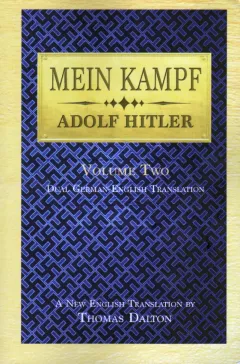HI FRIENDS. Well, I stopped my summaries of Mein Kampf, Vol. II after Chapter 8 back in November 2020, took a break for Thanksgiving through New Year, after which the madness of January 2021 began, with the U.S. Capitol “riot” and the beginning of the criminal Biden administration taking center stage. Now that I've slowed way down on writing original commentary, and finished making much more of my site content visible and linked from the front page side bar (have you noticed?), I've decided to complete the special section on Mein Kampf (still so relevant today). So we begin with Chapter 9, Vol. II, using Thomas Dalton's side-by-side German to English translation (pictured here). Enjoy.
Chapt. 9, p 285 Basic Ideas Regarding the Meaning and Organization of the S.A. Summary (Part One)
9.1 The three bases for authority in a state are popularity, power (force,) and tradition. Popularity alone is weak and must be bolstered with power. If these two are united, the authority becomes more stable and secure. An invincible foundation is laid by adding the authority of tradition.
The 1918 Revolution totally abolished this last case (tradition) with the collapse of the old Reich, the elimination of the old State form, and the destruction of the old sovereign emblems and Reich symbols. Force also ceased to exist when the army was dissolved. As the armies at the Front arrived at the demobilizing centers, they fell into the confusion of so-called 'voluntary obedience' when confronted with the homeland's acid of disintegration, and the Soldiers' Councils. This left only popularity.
Every national body is made up of three main classes: the best of the people, whose virtues include particularly courage and self-sacrifice. At the other extreme are the worst dregs of humanity, in whom vice and selfishness prevail. Between are the third class, made up of the broad middle stratum who embody neither the best or the worst.
A nation's rise is marked exclusively by the absolute leadership of the extreme best.Times of national collapse are determined by the dominant influence of the worst elements. [This is the situation in the USA today under the Biden-Democrat administration.] The broad masses – that I have called the middle classes – come forward only when the two extreme sections are engaged in mutual struggle. In case of victory for one of the extremes, the middle readily submit to the victor. The middle never fight their own battles.
9.3 The truly enormous amount of heroic German blood that was shed during the four-and-half years [of the Great War] was irreplaceable. It was always a call for “volunteers to the Front', 'volunteers for patrol,' volunteer dispatch carriers,' 'volunteers for telephone squads,' and so on. It was always the same result: Beardless youths or mature men, filled with an ardent love for their Fatherland, with great personal courage or the highest sense of duty – tens of thousands, indeed hundreds of thousands – they came forth, and gradually this type of humanity grew scarcer and scarcer.
While, for four and a half years, our extreme best were being horrendously thinned on the battlefields, the broad middle of our nation gave its share of blood sacrifice, while our extreme worst succeeded wonderfully in saving themselves. This well-preserved scum of our nation then made the Revolution, and could do so only because the extreme best elements were no longer there to oppose it.
9.4 The German Revolution, from the very start, was only conditionally popular. In those days of December, January, and February 1918-1919, the matadors of the Revolution felt the ground trembling beneath their feet, and they looked around them for men who, through love of their people, would stengthen them—by force of arms. But their popularity was grounded only on a society of hooligans, thieves, burglars, deserters, slackers, etc. Hence the cry for help sent out by the public representatives went unheard. [...]
Then, for the first time, large numbers of young Germans appeard who were ready once again to button on the military uniform in the service of peace and order. As volunteer soldiers, they formed into free corps and, although hating the Revolution, began to defend and, in practice, to secure it. They acted in the best of faith. [...]
9.7 A minority of the worst elements had made the Revolution, and they were immediately backed by all the Marxist parties. The Revolution itself outwardly appeared moderate, which aroused the anger of the fanatical extremists.To prevent terror from developing further, a truce was concluded between the new regime and the old order, to wage a common fight against the extremists, with the result that a fight by the old state against the new was averted. Only for this reason was it possible that a nation in which nine-tenths of the people hadn't joined in a revolution, with many repudiating it and even hating it – could have this Revolution imposed upon them by the remaining one tenth.
As the Spartacists and the Nationalists gradually petered out, the masses of the middle triumphed. The Republic began to be 'consolidated.' Honesty, it was not. Since the common bourgeois politician had broken with the monarchy, he now felt better in the slime of republican corruption than in the harsh decency of the forgotten State.
Next up: Part Two
- Printer-friendly version
- 487 views





